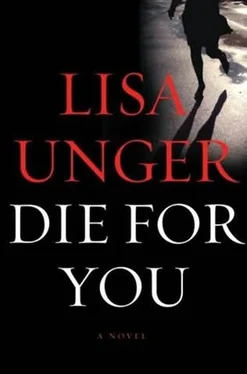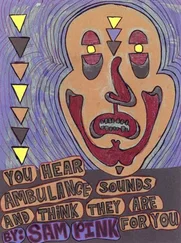She put her head in her free hand. Why was everyone always going on about what was fair? What about life or marriage or having kids was fair? When did happiness become the goddamn Holy Grail? Didn’t you sometimes have to put up with a little bit of unhappiness for the sake of other people-like your kids, for instance? Who never, by the way, asked you to bring them into the world to put up with your issues?
“When did you do this?” she asked. She found herself disappointed in him, somehow less attracted to him for his having left his family.
“Yesterday.”
She understood it now, his arrival at her doorstep, the desperate lovemaking. “Why didn’t you tell me this morning?”
“You were so worried, so distracted. I didn’t want to add to your problems.”
“I’m sorry, Ben.” She wasn’t sure what she was apologizing for, or if it was an apology at all. Maybe it was more an expression of her sorrow at the situation they’d put themselves in.
“You love him, don’t you?” he said, issuing a dry cough as though the words caused him physical pain. “Your husband.”
Erik had wept today when he told her what he had done. She’d never seen him that way. She’d sat close to him and held him, rubbed the back of his neck like she did for the kids when they were upset-even though she could have righteously been screaming at him, even hitting him. She was so angry with him, so frightened about the future now. His actions had stripped them of something vital to her sense of well-being, their financial security. He’d deceived her, gone behind her back and gambled with their future. Just like her father had done to her mother. It sickened her to think that her whole life had been spent trying not to be like Margie and yet here she was. But as angry as she was at her husband, as stung as she was by what he’d done, she realized that she could never stop loving him, any more than she could stop loving Em or Trevor, or Isabel. It was that kind of love.
“I do, Ben,” she said. “You know that. I’ve always been honest with you.”
In the heavy silence that followed, she could feel how her words hurt him. Her cheeks started to burn-from shame or anger, she couldn’t say.
“I should go,” she said. “I shouldn’t have called at all.”
“You needed to talk,” he said quickly. “I’m sorry.”
“It’s all right. Take care of yourself.” Did she sound cold? She knew she did. She couldn’t help it.
“Linda, wait-” She heard his voice, but she pretended she didn’t, and pressed End , anyway. A second later, the phone, ringer off, started vibrating in her hand. It was him, calling her back. She pressed the button on the side of the phone that sent the call to voice mail and shoved it in her pocket. She slipped back into the darkened room and walked over to the window.
Trevor, Emily, and Fred all slept peacefully, their breathing a chorus of whispers-a high note, a low note, the rumble of a snore from Fred. A freezing rain started to fall, the icy flakes scratching at the window. Worry started up again, a restless anxiety that they were out there, Erik and Isabel, unreachable. She was momentarily distracted by the frame of the window, how the rain made crystalline images on the glass, how the orange glow she thought was ugly before looked golden now as it reflected off the rain. The rectangle of light from the door behind her was luminescent on the window, looked like a doorway to another place and time. She judged the light too low for the effect she’d want but itched for her camera just the same. Then she saw something that made every nerve ending in her body freeze solid like the ice on the glass.
A black Mercedes idled beneath one of the lampposts, its exhaust pluming up from behind, a filthy gray breath in the cold. She knew the car well, the dent and scratch on the driver’s side door, the custom rims he couldn’t really afford. She’d wept and laughed and made love and confessed in that car.
She saw the shadow of him in the driver’s seat; saw a bouncing orange point of light, the burning ember of a cigarette. It was Ben.
Was he out there watching her, waiting for her? Had he followed them here? She had been here for hours-had he been here all that time?
The phone started to vibrate in her pocket. She took it out to look at the screen.
Ben calling .
The cackling was really starting to grate on him. It sounded desperate and yet somehow cruel at the same time. He had observed women like this-wondering if it was a purely urban America phenomenon-older, the wrong side of forty, emaciated, their faces hardened masks, as if permanently set against the straining of vigorous exercise. Their small breasts looked flat and hard, their nails were square and deeply lacquered. They were often rude, crass, wearing their slim bodies like some passport for poor behavior. But despite all the deprivation, the starvation, the overexertion, they were still unattractive to the point of being repellent, with nasty sneers and cutting comments. They were still lonely, unhappy, unsatisfied-and hence bitter and mean.
Grady Crowe thought that American women had been sold a concept that failed them miserably. Spend every free moment of your time fretting about your body, the media urged, exercise, buy diet books, primp, preen, pluck, wax, and a man will find you attractive and love you forever. Don’t ever for one second worry about being loving or lovable, about kindness or finding fulfillment on some spiritual level. Just try to take up as little space as possible, be as small as possible, or you will be reviled and ridiculed by every industry posed to make a dime off of you-the fitness and publishing industries, even the medical industry. They’ll steal your money and your self-esteem. You’ll give it all and still be unhappy. In spite of all evidence to the contrary, they bought these ideas, believed whole-heartedly, built lives and lifestyles around them.
The cackling continued; Grady couldn’t hear himself think. He stared at Camilla Novak’s body and wanted to feel the scene, wanted to take in all the details, but he couldn’t. Erik Book sat head in hands on the sofa, trying to call out on his cell phone and finally giving up. He looked miserable. Grady wondered what it would be like to have five hundred grand to lose; he couldn’t muster too much sympathy for the loss of funds. But he wondered if the guy knew his wife was cheating on him. He could see it in her, something restless, something deeply unsatisfied.
He recognized it in hindsight in Clara, the way she had stopped looking at him in the same way. How she almost imperceptibly didn’t want to be held, how she slipped her hand from his grasp when they were out. He thought it was just the normal cooling of their years together. Yet another error in judgment. Like the one that caused them to go to Charlie Shane’s dump of a studio rather than to seek out Camilla Novak as Jez suggested. If they’d come here, maybe she’d still be alive. Shouldn’t he have better instincts than this? Lately it was just one mistake after another.
He took Camilla’s hand in his, feeling its weight, the delicacy of her bones through his gloves. He peered at a faint blue mark, a club stamp. He could just barely make it out: The Topaz Room . Never heard of it. He pulled out his cell phone and opened the Web browser, entered the name into the search engine. There was a listing up in Queens. He bookmarked it and shoved the phone back into his pocket.
More cackling, louder, more grating. He walked over to the CSI team; they all turned to look at him.
“There’s a dead woman here, show a little respect.” The cackler twisted her dried-up face at him.
“She can’t hear us, Detective,” she said nastily.
Читать дальше












